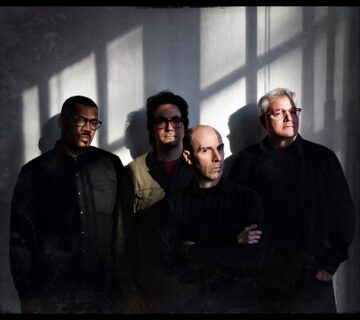
Steve and Joyce Feigenbaum, shown here at Salvador Dalí's house, continue to stuff Cuneiform's roster full of diverse artists. Courtesy Steve and Joyce Feibenbaum.
by Luke Stewart
Editorial board
Across the music industry’s diverse landscape, independent record labels have taken on many forms. Some dedicate themselves to documenting a particular music community and the genre it embraces; it was this path that led to the formation of D.C.’s Dischord Records, in response to the energy swarming around the area’s early-1980s hardcore punk scene. For Silver Spring, Md.-based Cuneiform Records, though, the start was a logical next step in the growth of a business, not a reaction to some geographically-based community. Still, in the more than a quarter-century since its founding, Cuneiform has become a sort of musical community unto itself. It has fostered the growth of countless boundary-pushing, often subterranean artists, whose music might not have found a substantial audience without the label.
Founded in 1984 as the outgrowth of a mail-order music sales company, Cuneiform has stood the test of time, a monumental achievement for an independent label that specializes in challenging, instrumental music. Throughout those years, and even more so recently, the label has become one of the world’s leading outlets for experimental rock and jazz. This weekend, it is raising the stakes, hosting its first area music festival, the two-day-long Cuneifest in Baltimore.
Nestled in a nondescript building a few blocks from downtown Silver Spring, Cuneiform’s headquarters look more like a warehouse for distribution than a label’s office, with a massive stock of CDs lining the walls. And in a sense, that’s exactly what they are: Both Cuneiform and the online music store Wayside Music, the seed that eventually sprouted the label, operate out of the space.
Cuneiform’s staff is small. There’s founder Steve Feigenbaum; his wife, Joyce Feigenbaum, who heads Cuneiform’s promotional and publicity department; Javier Díaz, Joyce’s right-hand man in the publicity department; and three interns, who work on tasks ranging from graphic design to office management. As a result, Steve and Joyce have grown accustomed to constantly needing more than 24 hours in each day. “I spend way too much time answering email, [and] I spend a lot of time listening to demos,” Steve said. He has amassed years of experience listening to music and has developed an ear for innovative and interesting sounds.
In the 1980s, way before the advent of the internet and amazon.com, consumers bought music at record stores, or through catalogs. Steve, 54, founded Wayside Music as a music mailer in 1980. “I had this mail-order business, I would send out catalogs, people would buy stuff, and having a label seemed like the next logical step,” he said. At the time, Steve was a 20-something dreamer who developed an idea and decided to run with it.
Growing up in suburban Maryland, he was an active member of a music community which included legendary Rockville jazz-rockers The Muffins. The label and music collective Random Radar Records was a group of musicians, artists and avant-gardist aficionados who released local and not-so-local music with similar, fringe-tilting styles. It was they who first introduced Steve to the music industry in his youth during the 1970s, and they were a source of inspiration as he began his endeavors in the music business. By the 1980s, the D.C. area’s youth culture, like those of many other cities, had been taken over by the punk rock movement. The District’s crucial importance in the movement had cast a dark shadow over almost everything done in the suburbs by the Muffins and Random Radar. In fact, the punk scene took attention away from much of the local music with an even more left-leaning sound that was being created all around it. “By the time I started Cuneiform … the D.C. punk scene had kind of killed all the music I was interested in at that point. They didn’t do it intentionally, but the interest [of the masses] had changed,” Steve recalled. As a result, from the very beginning of Cuneiform Records, the focus could never be purely on a local scene.

The Claudia Quintet is one of Cuneiform's best-known jazz artists. Courtesy Signe Maehler
The very first artist to release material on Cuneiform was legendary singer-songwriter R. Stevie Moore, who was introduced to Steve through the Muffins. Moore is most popularly known as the father of “lo-fi,” a rock sub-genre largely defined by purposely degraded sound quality in order to achieve a ragged musical aesthetic. (Early pioneers besides Moore include the Velvet Underground, Buddy Holly and Bob Dylan.)
Early on, the label focused on local underground groups. By the time of his eighth release, Steve had begun looking toward New York City, where new waves of free-improv musicians were getting their start in Manhattan’s “downtown scene.” As it expanded its artist roster, Cuneiform continued to release records of loose genre affiliations. Groups like Curlew are loosely affiliated with both jazz and rock, while Birdsongs of the Mesozoic maintains loose affiliations with rock and classical.
Cuneiform has developed a reputation based on eclecticism, and thereby attracts a range of audiences. Javier Diaz works in the label’s promotional department and describes the target audience as “anyone who enjoys music thoroughly, to the point where they’d like something different or challenging.” That pool is wide and deep, which is a reason for Cuneiform’s longevity in a music industry that has traditionally been unfriendly to independent labels, let alone ones that work along the fringe of both the market and popular trends in taste.
In recent years, the label has begun to attract many more jazz fans, due to a handful of stellar releases capturing the exciting energy of modern jazz. “The vein of experimental rock that I dealt with for a long time, it’s not too active right now, and there aren’t many places to get [those musicians] attention,” Steve said.
“I have specifically moved towards jazz [because] the majors have stopped recording it…. They’re not recording anybody new, so the opportunities for [Cuneiform] to work with better-known people has increased a lot…. There is also more of a willingness at this time among the jazz media to look at the big picture and see that it all fits into one thing…. Jazz doesn’t eat its own anymore. Rock is eating its own.”
Cuneiform has positioned itself to fill the void left by major labels’ refusal to release legendary jazz artists like Wadada Leo Smith, Roswell Rudd or Steve Lacy. This has opened up an opportunity for the label to easily approach A-list artists such as those, as well as top-notch contemporary innovators like the Claudia Quintet and Ideal Bread. (Editor’s note: Ideal Bread is playing at Red Door on Monday in a CapitalBop-sponsored show, which has no affiliation with Cuneiform or with Cuneifest.)
For the Claudia Quintet’s John Hollenbeck, a relationship with the label arrived easily, when Steve fell in love with the band’s music. “Steve came to our first two gigs in the D.C. area, around 2000,” Hollenbeck recalled via email. “He approached me and asked if I would send him any new recordings that we had done. It was as simple as that!” Now Claudia Quintet’s brand of improvisation – drawing from an array of jazz and rock influences – has become Cuneiform Records’ “success story of the decade,” according to Steve.
For an independent label working within a niche market, the most important element is getting the word out about the artists, the label and the music. That gives Joyce’s job a major significance.
“In brief, what Javier and I do in promotion is probably best described as music activism,” she said. “That’s even more accurate than us simply being translators for avant music, because translation can be a passive act or one done on the request of the person needing the translation. We don’t simply translate, but we actively fight for the music we believe in, against the odds, all the while trying to get the mainstream media to pay attention to our artists and give them/our cause wider exposure, but without the budgets or resources that mainstream/corporate music has…. It’s a challenge, and occasionally frustrating, but it’s exciting and essential work.”
Cuneiform fulls substantial weight in the small world of avant/experimental/eclectic music, but in the grand scheme of the music industry, keeping up is especially daunting for a label of this kind. Not only are there corporate competitors at work, there are peoples’ individual tastes and aesthetics, which are determined largely by corporate forces.
Cuneiform has come a long way, and has now reached a point where it is now organizing its own festival, showcasing a smattering of their most compelling contemporary artists. “The festival started because John Zorn approached me … about a series at the Stone,” Steve said, referring to the famous avant music venue in Manhattan’s Lower East Side.
Cuneiform is in the midst of a two-week showcase at the Stone, which its staff hopes will help expose the label as an important force in the jazz capital. In addition, this weekend’s Cuneifest in Baltimore will spread awareness of the label’s work in the fertile Baltimore avant-garde scene. Cuneifest in a unique two-day, bifocused festival; split into a rock day (Saturday) and jazz day (Sunday), it will showcase two sides of the vast Cuneiform catalog. Rock day will take place at the Orion Sound Studios in south Baltimore, a DIY venue that has hosted scores of experimental groups from around the world. Jazz Day will take place at the Metro Gallery, a multipurpose performance space just north of Baltimore’s Penn Station (it was originally planned for An Die Musik, but had to move). ![]()







[…] On Cuneiform Records. (My way of admitting guilt that I can’t be at Cuneifest.) […]
[…] On Cuneiform Records. (My way of admitting guilt that I can’t be at Cuneifest.) […]
[…] On Cuneiform Records. (My approach of revelation shame that we can’t be during Cuneifest.) […]
[…] On Cuneiform Records. (My way of admitting guilt that I can’t be at Cuneifest.) […]